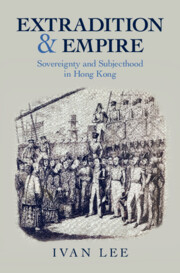Book contents
- Extradition and Empire
- Studies in Legal History
- Extradition and Empire
- Copyright page
- Contents
- Illustrations
- Acknowledgements
- Abbreviations of Archival Sources
- Introduction
- 1 Improvising Sovereignty
- 2 Domesticating Mobility
- 3 Navigating Disorder
- 4 Rationalising Reciprocity
- 5 Founding Alsatia
- Conclusion
- Notes
- Index
- Studies in Legal History
3 - Navigating Disorder
Published online by Cambridge University Press: 10 September 2025
- Extradition and Empire
- Studies in Legal History
- Extradition and Empire
- Copyright page
- Contents
- Illustrations
- Acknowledgements
- Abbreviations of Archival Sources
- Introduction
- 1 Improvising Sovereignty
- 2 Domesticating Mobility
- 3 Navigating Disorder
- 4 Rationalising Reciprocity
- 5 Founding Alsatia
- Conclusion
- Notes
- Index
- Studies in Legal History
Summary
This chapter examines the Hong Kong government’s practice of giving people up to foreign authorities during 1850–65 on charges of crimes committed at sea. Framed as ‘rendition’, an early version of extradition, this mechanism was used to remove several hundred accused pirates, mutineers, and other criminals of Chinese origin – criminals that officials believed China was better suited to punish. Other seafarers were also given up to France and the United States as the colony sought to take pressure off its overstretched and barely functional courts and prison system. Ideas of British sovereignty and the international law of piracy fuelled this pragmatic policy. Notably, officials believed that maritime crimes should only be tried in Hong Kong if they implicated ‘British interests’, specifically British victims, offenders, or territory. This rationale for jurisdictional restraint reached a controversial zenith in 1861. In the case of the French coolie ship, Ville D’Agen, a Peruvian sailor, Juan Pastor was nearly given up to China despite the absence of any treaty or statutory basis for his rendition.
Information
- Type
- Chapter
- Information
- Extradition and EmpireSovereignty and Subjecthood in Hong Kong, pp. 84 - 115Publisher: Cambridge University PressPrint publication year: 2025
Accessibility standard: WCAG 2.0 A
Content Navigation
Allows you to navigate directly to chapters, sections, or non‐text items through a linked table of contents, reducing the need for extensive scrolling.
Provides an interactive index, letting you go straight to where a term or subject appears in the text without manual searching.
Reading Order & Textual Equivalents
You will encounter all content (including footnotes, captions, etc.) in a clear, sequential flow, making it easier to follow with assistive tools like screen readers.
You get concise descriptions (for images, charts, or media clips), ensuring you do not miss crucial information when visual or audio elements are not accessible.
You get more than just short alt text: you have comprehensive text equivalents, transcripts, captions, or audio descriptions for substantial non‐text content, which is especially helpful for complex visuals or multimedia.
Structural and Technical Features
You gain clarity from ARIA (Accessible Rich Internet Applications) roles and attributes, as they help assistive technologies interpret how each part of the content functions.
